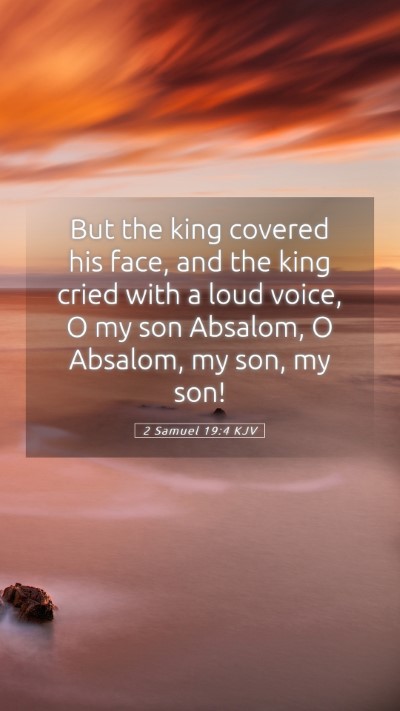Bible Verse Meaning and Commentary on 2 Samuel 19:4
In this verse, we find King David deeply affected by the events surrounding the death of his son Absalom. The emotional turmoil expressed by David provides a profound insight into themes of grief, loss, and the complexities of familial relationships. This commentary combines interpretations from well-known public domain sources to provide a comprehensive analysis of 2 Samuel 19:4.
Verse Context
2 Samuel 19:4 states: "But the king covered his face, and the king cried with a loud voice, 'O my son Absalom, O Absalom, my son, my son!'
Emotional Depth in Grief
This verse portrays King David's overwhelming grief at the loss of Absalom. Matthew Henry reflects on how David's mourning demonstrates the deep parental love and sorrow that can exist despite conflict and betrayal. David's words, "O my son Absalom," speak not just to his pain but also echo a lament for the strained relationship they had:
- Conflict in Relationship: David's mourning underscores the tumultuous dynamics between father and son, primarily as Absalom had rebelled against him.
- Expressive Mourning: Adam Clarke notes that David’s public display of grief highlights his sensitivity as a leader and father, showing an aspect of vulnerability that contrasts the king's usual strength.
The Nature of Leadership and Loss
Albert Barnes emphasizes that David's lamentation reflects the weight of leadership. The king is not only mourning his son but is also facing the consequences of Absalom's rebellion:
- Burden of Kingship: Leaders often bear the heavy burden of maintaining social order while grappling with personal loss, an insight applicable to many life situations.
- Public vs. Private Grief: David's actions reveal that public leaders are often scrutinized in their private pain, a topic worthy of exploration in Bible study groups.
Theological Insights
This verse also opens discussions on the nature of God's mercy in the midst of human betrayal. Despite Absalom's wrongs, David's heart reveals an eternal love, suggesting a divine reflection of God's compassion towards His wayward children. Matthew Henry goes further to connect this sentiment to:
- God's Unchanging Love: Just as David mourned, God expresses a profound sorrow for His people when they stray away.
- Repentance and Hope: The hope of restoration stems from the desire for reconciliation, a central theme throughout biblical narratives.
Life Application
In applying the meaning of this verse to daily life, we can reflect on how it encourages us to express our feelings openly, recognizing that grief is universal and an essential part of the human experience. Adam Clarke's commentary provides practical advice on seeking healing through honest emotional expression:
- Healthy Grieving: Understanding that feelings of loss should be processed, whether through community support, prayer, or personal reflection.
- Reconciliation with the Past: Looking to mend strained relationships while we have the chance echoes the urgency of David's cry.
Cross References
This verse connects to several other biblical passages, enriching our understanding:
- 2 Samuel 15:14 - The rebellion of Absalom and David's decision to flee Jerusalem.
- Psalm 3 - A psalm of David during his flight from Absalom.
- 1 Kings 1:6 - An insight into the family dynamics and issues surrounding David’s kingship and his children.
Conclusion
In summary, 2 Samuel 19:4 provides a rich tapestry of insights for anyone studying the Bible. From its emotional depth to its theological implications and practical applications, this verse encourages a deeper understanding of grief, love, leadership, and God's mercy. Engaging with these themes can lead to valuable discussions in Bible study groups, enhancing our understanding of Scripture while exploring difficult Bible passages in a supportive environment.


